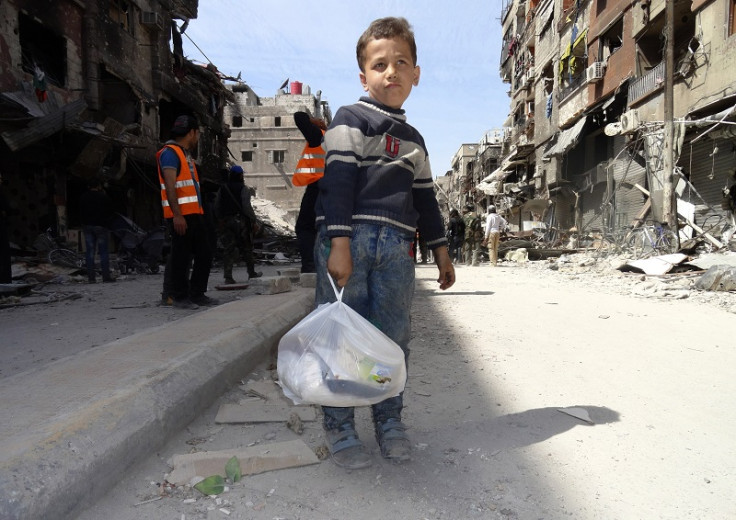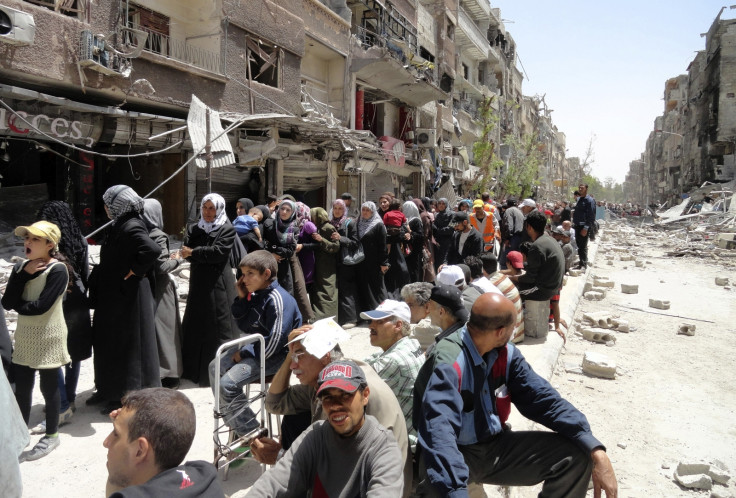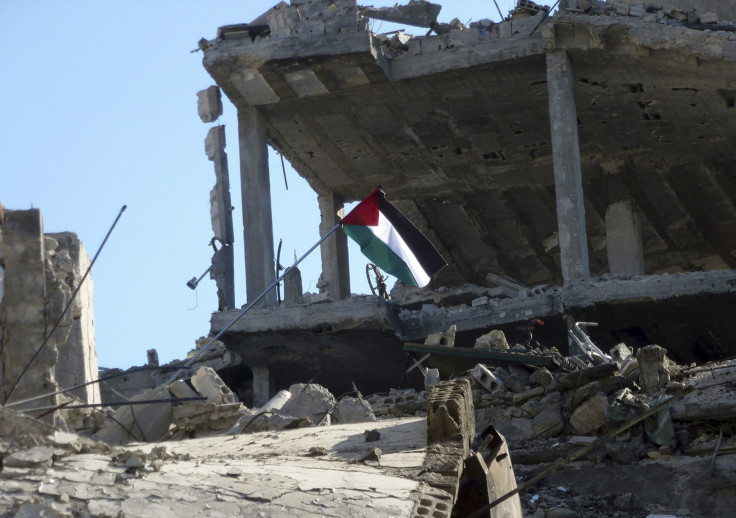Yarmouk: Isis-held Palestinian refugee camp that has become front line in Syria's civil war

Yarmouk has been embroiled in the Syrian conflict since the earliest days of the uprising against President Bashar al-Assad, occupied first by the Free Syrian Army (FSA) and then surrounded by the rebels on one side and regime on the other once the FSA withdrew in a Palestinian Liberation Organisation (PLO) brokered ceasefire.
Its proximity to Damascus – it is just 8km from the centre of the city – has made it a target for rebel groups and a red line for Assad, who has responded with barrel bombs, indiscriminate shelling of civilians and increasingly starvation, by cutting off the camp from the outside world.
As early as 2012 the UN was warning that the camp faced dire shortages of water and food and the publication of a photograph that showed tens of thousands of camp residents queuing for food on a heavily-bombed street brought war-torn Yarmouk to the world's attention in 2014.
From functioning suburb to war zone

It wasn't always like this. In fact, for the millions of Palestinian refugees spread across the Middle East, Syria was considered one of the more favourable countries, where refugees were given ID cards and the freedom to buy property and enter the workforce relatively freely.
Yarmouk, first established in 1957, had grown from a few thousand tents to a shabby but functioning suburb of the Syrian capital, home to many white-collar workers – both Syrian and Palestinian – who would commute the short distance into Damascus daily.
Before the start of the war, it was home to 180,000 Palestinians and Syrians.
It was for this reason that when the Syrian conflict first began, many Palestinians were unwilling to get involved.
"Prior to the civil war Palestinian refugees were relatively well integrated into Syria's social fabric, enjoying better socio-economic and legal conditions than in neighbouring countries, especially Lebanon," said Hugh Lovatt at the European Council on Foreign Relations.
He said that Palestinians were particularly keen to avoid the fate suffered by refugees in Lebanon which arose from the participation of Palestinian groups in the Lebanese Civil War during the 1980s, when thousands were killed and many forced to leave the country.
"Consequently, Palestinian refugees, in particular those in Yarmouk, did their best to remain neutral once the civil war erupted," he said.
As the insurgency against Assad intensified during 2011 and 2012, the Free Syrian Army (FSA) and Palestinians who supported them began fighting regime forces and the Popular Front for the Liberation of Palestine - General Committee (PFLP-GC), which was loyal to Assad.
The situation in Yarmouk led to the PLO negotiating a ceasefire in 2013 that saw non-Palestinian groups leaving the camp, but which did little to change the situation on the ground. In 2014 the UN warned that the 10% of residents that remained "had the appearance of ghosts" and were being slowly starved by the warring groups that surrounded them.
Islamic State move in

After IS entered the camp on 1 April – the group now appears to be in control of as much as 90% of it – things have taken an even uglier turn, said United Nations Relief and Works Agency for Palestine Refugees in the Near East (UNRWA).
"The situation in the camp is beyond inhumane. There is no food, there is no water and there is very little medicine... People are holed up in their houses, there is fighting going on in the streets. There are reports of... bombardments. This has to stop and civilians must be evacuated," Chris Gunness, UNRWA spokesman, warned this week.
UNRWA said that for over a year the besieged inhabitants of Yarmouk, including 3,500 children, had been reliant on its irregular distributions of food and other assistance and though the level of aid was well below the minimum required, it had been a lifeline. The arrival of IS will cut that off completely.
Wesam Sabaaneh, who works for the Jafra Foundation for Youth Development and Relief, told IBTimes UK on Tuesday (7 April) that IS had stolen food and medicine in Yarmouk camp that was reserved for Palestinian civilians. The two main hospitals in the area have shut down because of lack of medical equipment and there was no electricity, he said.
"We try to speak with these families every day but a lot of them are trapped in their houses and the streets are blocked because of the shelling and the clashes. It's difficult even to communicate with them. Our volunteers are inside the camp, but they cannot bring food and medicine or evacuate civilians. It's very dangerous for everybody to access the camp," Sabaaneh said.
The bewildering range of militant groups and allegiances in Yarmouk is as complex as elsewhere in the Syrian conflict. Within Yarmouk there is Aknaf Beit al-Maqdis, a Yarmouk branch of Hamas, a splinter group of the Popular Front for the Liberation of Palestine, PFLP-GC, the Free Syrian Army (FSA) and a number of Islamist factions including rivals Jabhat al-Nusra and Jaish al-Islam.
Jabhat al-Nusra was controlling the entrances to the camp and allegedly let IS militants pass through in their push towards Damascus last week. Now, Palestinian groups Jaish al-Islam and the FSA are fighting IS street by street in order to take back control of the camp. IS have reportedly caught and beheaded a number of Palestinian fighters.
Writing in UAE newspaper the National, Middle East analyst and author of a recent book on IS, Hassan Hassan, said that the battle for Yarmouk would not only be critical for securing the fate of the Palestinian refugees that live there, but could change the direction of the Syrian war.
"The outcome in Yarmouk threatens to be a turning point for the areas around Damascus. For two years, Isis has sought to establish strongholds for itself with little success.... Most of the camp is now under the control of Isis," he said.
"[IS's] presence near Damascus [...] will likely help it attract more recruits [...]. It relies on buying loyalties, creating sleeper cells, exploiting local rivalries and setting up courts when its presence is secured. The Isil offensive in Yarmouk is the second attempt in a year. It should not be taken lightly."
© Copyright IBTimes 2025. All rights reserved.






















